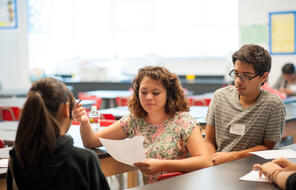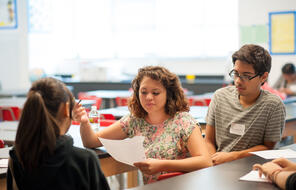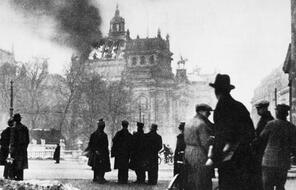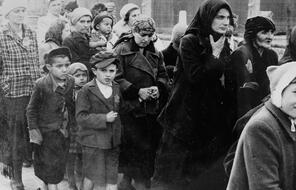Russia Quits the War
At a Glance
Language
English — USSubject
- History
- Human & Civil Rights
- The Holocaust
The year 1917 brought two major changes in World War I. First, in its continuing effort to prevent all countries’ ships from transporting food and supplies to Britain, the German navy’s submarines sank several American ships. In response, President Woodrow Wilson asked for a declaration of war against Germany and the Central powers in April. The declaration brought a powerful new army into the war on the side of the Allied powers. The second change was occurring as Congress voted to approve the American president’s request: a revolution had begun to take place in Russia.
Bolshevik Agitator
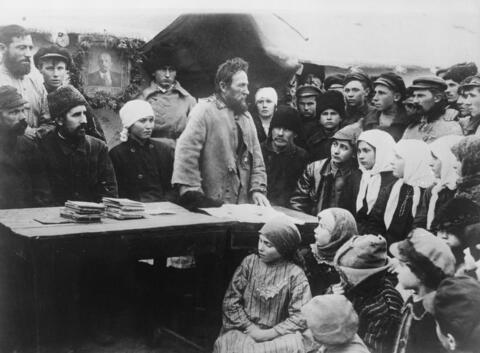
Bolshevik Agitator
Standing with a portrait of Vladimir Lenin, a communist agitator advocates for the Bolshevik program to Russian peasants sometime between 1918 and 1924.
The monarchy of the Russian tsar had been vulnerable since a revolution against its autocratic power had been attempted and brutally put down in 1905. By 1917, participation in World War I had resulted in disaster for the tsar’s armies and government. The nation’s casualties were much higher than those of any other country, and its economy was in shambles. On March 8, another revolution began when food shortages prompted hundreds of women to riot in the streets of St. Petersburg, the empire’s capital. In the days that followed, the violence spread to other cities and towns. Disheartened soldiers increasingly joined the revolt. In less than two weeks, Tsar Nicholas II had to give up his throne at the urging of the Duma, Russia’s parliament. Members of the Duma then set up a provisional, or temporary, government that shared power with councils of soldiers and workers, called “soviets.”
German authorities saw the upheaval in Russia as a chance to end the war in the east. They knew that Russian Communists known as Bolsheviks had long opposed the war and were eager to make peace. But the tsar had exiled their leaders, including Vladimir Lenin, years earlier. Hopeful that their return would undermine the Russian war effort, the Germans allowed Lenin and other Bolsheviks to return to Russia from exile in Switzerland.
Soon after his arrival in Russia, Lenin called for the overthrow of the provisional government by the soviets. But there was little response to his demand; most people were willing to give the new government a chance. As a result, Lenin was once again forced into exile. Within a few months, however, starving Russians weary of war had become impatient with the slow pace of change under the provisional government. Lenin’s calls for “peace, land [for farm laborers and workers], and bread” now attracted more followers. By October, he was back in Russia, and by November 7, his Bolshevik-led army, the Red Guard, had forced out the provisional government and proclaimed government by the soviets.
Lenin believed that Russia must end its participation in the war so that the nation could focus on building a communist state based on the ideas of Karl Marx, a German philosopher who lived in the mid-1800s. Marx argued that the struggle between workers and property owners would end only when workers as a community owned all land and other resources. The system Marx envisioned was a radical form of socialism; its underlying idea was that the government should take work from each citizen according to his or her ability and give goods and services to each according to his or her need.
Lenin revised many of Marx’s ideas to make them more applicable to Russia. Marx believed that communism would be most successful in an industrialized country with a large worker class, but Russia was not as industrialized as other European countries. Lenin did not believe that Russian workers themselves could bring about a revolution. He thought that the country would instead need a small group of leaders to plan and direct the revolution and then rule the country until the people were ready to lead on their own.
In March 1918, the new Russian government, now under Lenin’s leadership, signed a peace treaty with Germany at Brest-Litovsk in what is now Belarus. Lenin had no say in the terms of that treaty; the Germans imposed it by threatening to resume their attacks on Russia if the agreement was not signed immediately. Under the treaty, Russia had to turn over several territories to Germany: Finland, Russian Poland, Estonia, Livonia, Courland (now part of Latvia), Lithuania, Ukraine, and Bessarabia. In addition, the Bolsheviks had to give much of the southern part of Russia to what was still the Ottoman Empire, controlled by Turkey. In all, the treaty forced Russia to give up about 30% of its territory. 1
The treaty ended Russian participation in World War I, but it did not bring peace to Russia. Even before it was signed, the Communists found themselves in a vicious civil war with the White Army, a group that wanted to restore the Russian monarchy and that had the support of the Allies. The Communists also faced opposition from various nationalist groups within the Russian Empire; each wanted its own independent country. In addition, the country was filled with outlaws who hoped to acquire wealth and power amid the confusion. As a result, in some parts of Russia, no one was in control, and enormous suffering and loss of life among the civilian population resulted. It was not until 1920 that most of the fighting finally ended and Lenin and his followers could focus on turning Russia into a communist state. Two years later, the Communists gave the nation a new name—the Union of Soviet Socialist Republics (USSR), also known as the Soviet Union.
Leaders of western nations, particularly the United States and Britain, watched with anxiety as the Bolshevik Revolution in Russia succeeded. Communism, which rejected religion and which wanted to end private ownership of property as the means of producing wealth, was opposed to the economic and social systems of those countries. It was also noted that Leon Trotsky, who, besides Lenin, was the other major leader of the Russian Revolution, was Jewish. That fact further fueled antisemitism in Europe and inflamed fears that a supposed Jewish-Bolshevik conspiracy was plotting to dominate the world—a conspiracy theory that would persist, especially in Germany during the 1920s and 1930s.
Connection Questions
- How did the war contribute to the downfall of the Russian monarchy? Why did Lenin’s ideas eventually appeal to many Russians? Who stood to benefit from those ideas?
- What were the terms of the Treaty of Brest-Litovsk? Why did Lenin lack the leverage to negotiate a better treaty for Russia?
- How did other nations respond to news of Russia’s revolution? What fears were sparked by the news?
- 1Doris L. Bergen, War and Genocide: A Concise History of the Holocaust, 3rd ed. (Lanham: Rowman & Littlefield, 2016), 42. Reproduced by permission from Rowman & Littlefield Publishing Group.
How to Cite This Reading
Facing History & Ourselves, "Russia Quits the War," last updated August 2, 2016.



